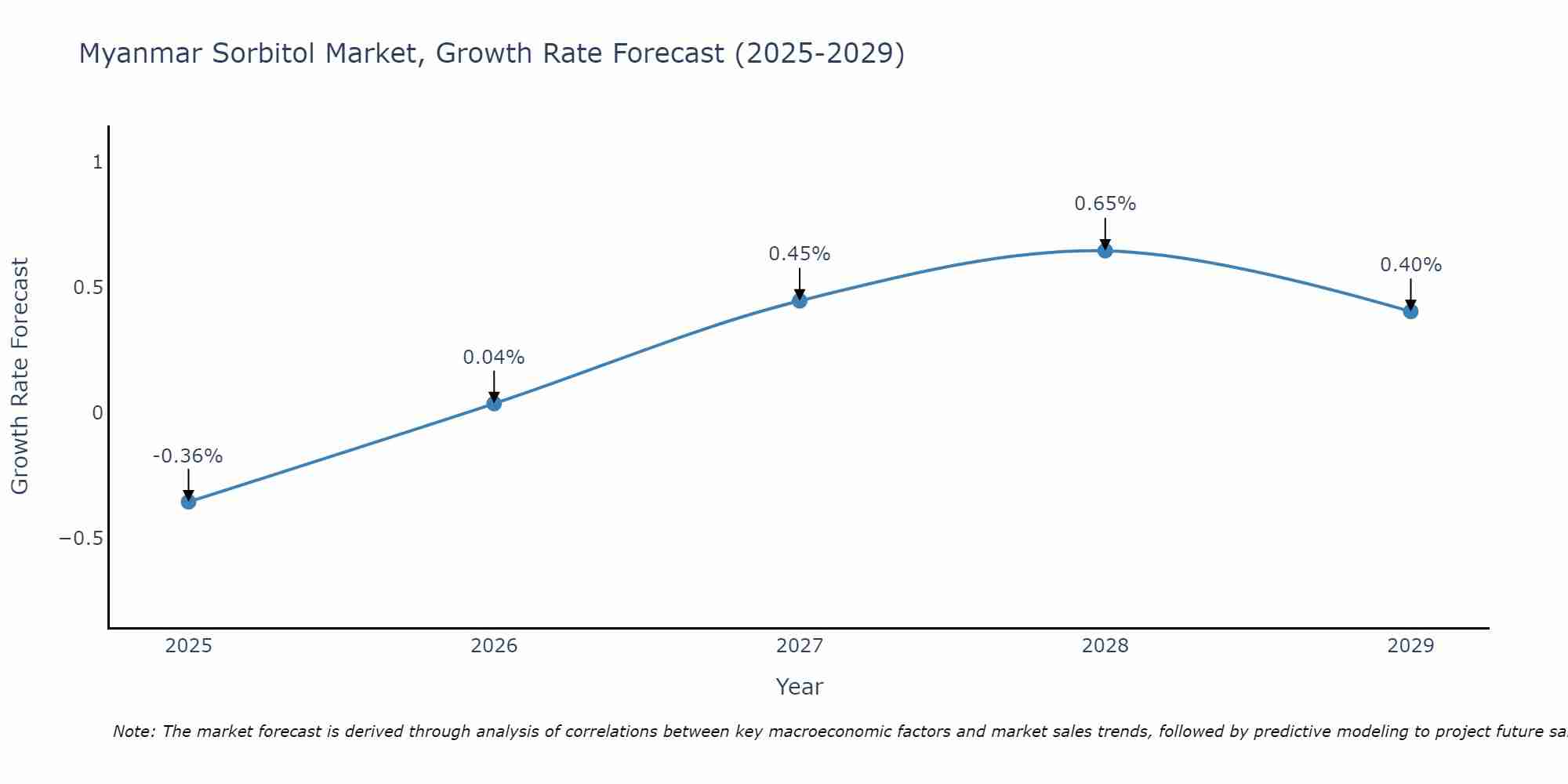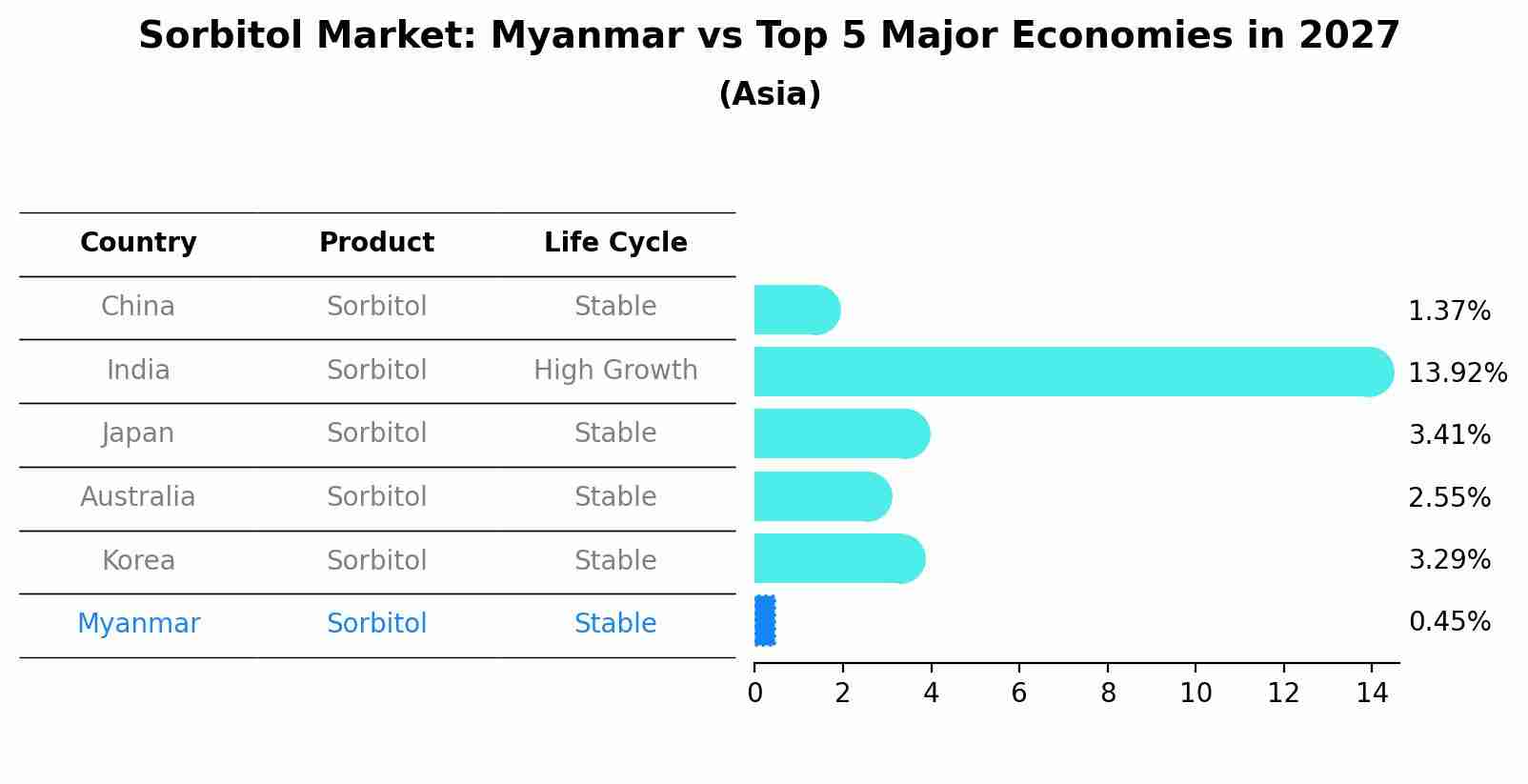Myanmar Sorbitol Market (2025-2031) Outlook | Value, Revenue, Growth, Forecast, Size, Companies, Share, Trends, Industry & Analysis
| Product Code: ETC089993 | Publication Date: Jun 2021 | Updated Date: Jun 2025 | Product Type: Report | |
| Publisher: 6Wresearch | Author: Dhaval Chaurasia | No. of Pages: 70 | No. of Figures: 35 | No. of Tables: 5 |
Myanmar Sorbitol Market Size Growth Rate
The Myanmar Sorbitol Market is projected to witness mixed growth rate patterns during 2025 to 2029. Growth accelerates to 0.65% in 2028, following an initial rate of -0.36%, before easing to 0.40% at the end of the period.

Sorbitol Market: Myanmar vs Top 5 Major Economies in 2027 (Asia)
The Sorbitol market in Myanmar is projected to grow at a stable growth rate of 0.45% by 2027, highlighting the country's increasing focus on advanced technologies within the Asia region, where China holds the dominant position, followed closely by India, Japan, Australia and South Korea, shaping overall regional demand.

Myanmar Sorbitol Market Overview
The Myanmar sorbitol market is experiencing steady growth driven by the increasing demand for sugar substitutes in the food and beverage industry. Sorbitol, a sugar alcohol commonly used as a sweetening agent, is gaining popularity due to its low-calorie content and sugar-like taste. The market is also witnessing growth in the pharmaceutical and personal care sectors where sorbitol is used as a humectant and skin conditioning agent. Key players in the Myanmar sorbitol market are focusing on product innovation and expanding their distribution networks to cater to the rising demand. The market is expected to continue growing as consumers become more health-conscious and seek out alternative sweeteners.
Myanmar Sorbitol Market Trends
The Myanmar sorbitol market is experiencing growth due to increasing demand from the food and beverage industry as a low-calorie sweetener and texturizing agent. Additionally, the rising awareness about health benefits associated with sorbitol consumption, such as its tooth-friendly properties and suitability for diabetics, is driving market growth. The pharmaceutical industry is also a key consumer of sorbitol in Myanmar, further boosting market demand. However, challenges such as fluctuating raw material prices and regulatory constraints may impact market growth in the near future. Overall, the Myanmar sorbitol market is expected to continue expanding as manufacturers innovate to meet the growing demand for healthier and functional food products in the country.
Myanmar Sorbitol Market Challenges
The Myanmar Sorbitol market faces several challenges, including limited awareness and understanding of the product among consumers and manufacturers, which hinders widespread adoption. Additionally, the lack of advanced technology and infrastructure for sorbitol production and distribution in Myanmar poses a challenge in meeting the growing demand. Import restrictions and regulations on sorbitol products also impact market growth and accessibility. Finally, competition from alternative sweeteners and sugar alcohols further complicates market penetration and growth prospects for sorbitol in Myanmar. Overcoming these challenges will require strategic marketing efforts to educate stakeholders, investments in technology and infrastructure, as well as advocacy for favorable trade policies to support the growth of the sorbitol market in the country.
Myanmar Sorbitol Market Investment Opportunities
Investment opportunities in the Myanmar sorbitol market include the rising demand for sorbitol as a low-calorie sweetener in food and beverage products due to increasing health consciousness among consumers. Additionally, the growing use of sorbitol in pharmaceuticals and personal care products as a sugar substitute and humectant presents another avenue for investment. Myanmar`s favorable geographical location and growing manufacturing sector further support the potential for investment in sorbitol production facilities to cater to both domestic demand and export opportunities. Investors can also explore partnerships with local manufacturers to capitalize on the expanding market for sorbitol in Myanmar and tap into the region`s potential for economic growth in the coming years.
Myanmar Sorbitol Market Government Policy
Government policies related to the Myanmar Sorbitol Market are focused on promoting sustainable growth, ensuring product quality and safety, and encouraging investment in the industry. The government has implemented regulations to monitor and control the production, distribution, and sale of sorbitol to safeguard consumer health and maintain market stability. Additionally, policies aim to support local sorbitol manufacturers through incentives, subsidies, and technical assistance to enhance competitiveness and expand market reach. The government also prioritizes environmental sustainability by enforcing regulations on waste management and production processes within the sorbitol industry. Overall, Myanmar`s government policies are geared towards fostering a thriving and responsible sorbitol market that contributes to the country`s economic development and meets international standards.
Myanmar Sorbitol Market Future Outlook
The Myanmar Sorbitol market is expected to witness steady growth in the coming years, driven by increasing demand from industries such as food and beverage, pharmaceuticals, and personal care. The growing awareness of the health benefits of sorbitol as a sugar substitute and its wide range of applications as a sweetening agent, thickening agent, and humectant are likely to fuel market expansion. Additionally, the rising disposable income levels and changing consumer preferences towards healthier alternatives are anticipated to further boost market growth. However, challenges such as fluctuating raw material prices and regulatory constraints may hinder the market`s growth trajectory. Overall, the Myanmar Sorbitol market is poised for growth opportunities, supported by increasing industrial applications and consumer awareness of healthier ingredients.
Key Highlights of the Report:
- Myanmar Sorbitol Market Outlook
- Market Size of Myanmar Sorbitol Market, 2021
- Forecast of Myanmar Sorbitol Market, 2031
- Historical Data and Forecast of Myanmar Sorbitol Revenues & Volume for the Period 2021 - 2031
- Myanmar Sorbitol Market Trend Evolution
- Myanmar Sorbitol Market Drivers and Challenges
- Myanmar Sorbitol Price Trends
- Myanmar Sorbitol Porter's Five Forces
- Myanmar Sorbitol Industry Life Cycle
- Historical Data and Forecast of Myanmar Sorbitol Market Revenues & Volume By Product Type for the Period 2021 - 2031
- Historical Data and Forecast of Myanmar Sorbitol Market Revenues & Volume By Liquid/Syrup Sorbitol for the Period 2021 - 2031
- Historical Data and Forecast of Myanmar Sorbitol Market Revenues & Volume By Crystal/Powder Sorbitol for the Period 2021 - 2031
- Historical Data and Forecast of Myanmar Sorbitol Market Revenues & Volume By Application for the Period 2021 - 2031
- Historical Data and Forecast of Myanmar Sorbitol Market Revenues & Volume By Cosmetics & Personal Care for the Period 2021 - 2031
- Historical Data and Forecast of Myanmar Sorbitol Market Revenues & Volume By Food & Beverage for the Period 2021 - 2031
- Historical Data and Forecast of Myanmar Sorbitol Market Revenues & Volume By Pharmaceuticals for the Period 2021 - 2031
- Historical Data and Forecast of Myanmar Sorbitol Market Revenues & Volume By Creams and emulsions for the Period 2021 - 2031
- Historical Data and Forecast of Myanmar Sorbitol Market Revenues & Volume By Medicated confectionery for the Period 2021 - 2031
- Historical Data and Forecast of Myanmar Sorbitol Market Revenues & Volume By Chemical for the Period 2021 - 2031
- Historical Data and Forecast of Myanmar Sorbitol Market Revenues & Volume By Other Industries for the Period 2021 - 2031
- Myanmar Sorbitol Import Export Trade Statistics
- Market Opportunity Assessment By Product Type
- Market Opportunity Assessment By Application
- Myanmar Sorbitol Top Companies Market Share
- Myanmar Sorbitol Competitive Benchmarking By Technical and Operational Parameters
- Myanmar Sorbitol Company Profiles
- Myanmar Sorbitol Key Strategic Recommendations
Frequently Asked Questions About the Market Study (FAQs):
- Single User License$ 1,995
- Department License$ 2,400
- Site License$ 3,120
- Global License$ 3,795
Search
Thought Leadership and Analyst Meet
Our Clients
Related Reports
- Canada Oil and Gas Market (2026-2032) | Share, Segmentation, Value, Industry, Trends, Forecast, Analysis, Size & Revenue, Growth, Competitive Landscape, Outlook, Companies
- Germany Breakfast Food Market (2026-2032) | Industry, Share, Growth, Size, Companies, Value, Analysis, Revenue, Trends, Forecast & Outlook
- Australia Briquette Market (2025-2031) | Growth, Size, Revenue, Forecast, Analysis, Trends, Value, Share, Industry & Companies
- Vietnam System Integrator Market (2025-2031) | Size, Companies, Analysis, Industry, Value, Forecast, Growth, Trends, Revenue & Share
- ASEAN and Thailand Brain Health Supplements Market (2025-2031) | Strategy, Consumer Insights, Analysis, Investment Trends, Opportunities, Growth, Size, Share, Industry, Revenue, Segments, Value, Segmentation, Supply, Forecast, Restraints, Outlook, Competition, Drivers, Trends, Demand, Pricing Analysis, Competitive, Strategic Insights, Companies, Challenges
- ASEAN Bearings Market (2025-2031) | Strategy, Consumer Insights, Analysis, Investment Trends, Opportunities, Growth, Size, Share, Industry, Revenue, Segments, Value, Segmentation, Supply, Forecast, Restraints, Outlook, Competition, Drivers, Trends, Demand, Pricing Analysis, Competitive, Strategic Insights, Companies, Challenges
- Europe Flooring Market (2025-2031) | Outlook, Share, Industry, Trends, Forecast, Companies, Revenue, Size, Analysis, Growth & Value
- Saudi Arabia Manlift Market (2025-2031) | Outlook, Size, Growth, Trends, Companies, Industry, Revenue, Value, Share, Forecast & Analysis
- Uganda Excavator, Crane, and Wheel Loaders Market (2025-2031) | Strategy, Consumer Insights, Analysis, Investment Trends, Opportunities, Growth, Size, Share, Industry, Revenue, Segments, Value, Segmentation, Supply, Forecast, Restraints, Outlook, Competition, Drivers, Trends, Demand, Pricing Analysis, Competitive, Strategic Insights, Companies, Challenges
- Rwanda Excavator, Crane, and Wheel Loaders Market (2025-2031) | Strategy, Consumer Insights, Analysis, Investment Trends, Opportunities, Growth, Size, Share, Industry, Revenue, Segments, Value, Segmentation, Supply, Forecast, Restraints, Outlook, Competition, Drivers, Trends, Demand, Pricing Analysis, Competitive, Strategic Insights, Companies, Challenges
Industry Events and Analyst Meet
Whitepaper
- Middle East & Africa Commercial Security Market Click here to view more.
- Middle East & Africa Fire Safety Systems & Equipment Market Click here to view more.
- GCC Drone Market Click here to view more.
- Middle East Lighting Fixture Market Click here to view more.
- GCC Physical & Perimeter Security Market Click here to view more.
6WResearch In News
- Doha a strategic location for EV manufacturing hub: IPA Qatar
- Demand for luxury TVs surging in the GCC, says Samsung
- Empowering Growth: The Thriving Journey of Bangladesh’s Cable Industry
- Demand for luxury TVs surging in the GCC, says Samsung
- Video call with a traditional healer? Once unthinkable, it’s now common in South Africa
- Intelligent Buildings To Smooth GCC’s Path To Net Zero


















